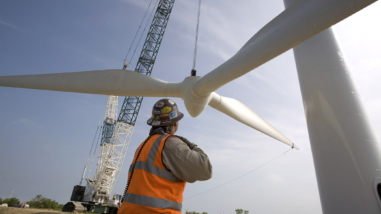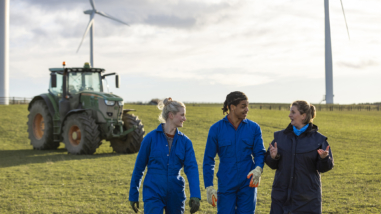Seizing a historic opportunity to strengthen our economy, democracy, and climate

A little over a year ago, the Inflation Reduction Act (IRA) was passed and signed into law, committing over $500 billion to strengthen communities while transforming our energy systems. In combination with two bipartisan laws, the Infrastructure and Investment in Jobs Act and the CHIPS and Science Act, the IRA creates an unprecedented opportunity to address some of the most pressing challenges of our time — from lack of faith in our democracy, to the climate crisis, to pervasive inequities. But as grantmakers with experience in policy implementation and community-based work, we know that success in ensuring these laws help the greatest number of people is not guaranteed. It requires more than government action.
How can philanthropy be most helpful? Over the past year, we conferred with hundreds of people — individuals as diverse as our nation and from all corners of the U.S. — to get their thoughts on how philanthropy could make real the promises of legislation, including providing support to communities benefiting from these new federal investments. This included leading experts in economic and workforce development, clean energy deployment, rural revitalization, the federal workforce, and racial and economic justice. We heard from individuals representing Tribal, rural, and environmental justice communities who were excited about the opportunity these new laws created and nervous about their community being left behind. We heard about the need for creative solutions to issues like modernizing the infrastructure of government agencies and advancing clean energy projects at the speed and scale we need to stave off the worst climate disasters. We heard a desire to invest in community agency, particularly in those communities facing pervasive inequities, so they can advance locally led solutions that work for them. And we heard a clear ask for Hewlett to work across programs — and with other donors — to make our funding as impactful as possible.
These conversations provided a clear sense that the scale of these federal investments had implications for all of our programs. Now we are investing time, energy, and charitable resources to support nonprofits working in state and local communities to make the most of this federal action and to address the full spectrum of opportunities and challenges we heard in our conversations. In addition to committing $50 million in new funding to ensure this moment is not wasted, we are collaborating with a range of partners similarly interested in strengthening our economy and our democracy, addressing climate change, and ensuring all communities can thrive.
One key effort is Invest in Our Future, a donor collaborative that will distribute at least $180 million over the next three years to ensure that the clean energy economy is made real and benefits everyone. Comprised primarily of funders with climate expertise, the fund will help communities access federal funds; remove barriers to clean energy projects; accelerate the growth of the clean energy workforce; and share stories of progress along the way.
We are also joining BuildUS, which has an initial commitment of $50 million over the next three years and leverages significant expertise related to the economy and economic development to ensure communities across the country are able to take full advantage of the provisions in this historic legislation.
We also understand that for communities to see the benefits of these landmark legislative packages, our government agencies need to be well equipped and modernized. Yet in recent years, ratings of specific federal agencies and departments — including the IRS, which is essential for the successful implementation of the legislation — have declined, according to Gallup. With a working group of nonpartisan philanthropic partners, we are exploring how we can support the technical and capacity needs of government agencies that are engaged in administering policies so they are working effectively and delivering on the promise of these new laws.
We’re excited about what this moment can mean, if federal investments are effective, for communities across the U.S.: a future that is healthier, where more people have good, high-paying jobs and greater faith in their government responding to their needs.



